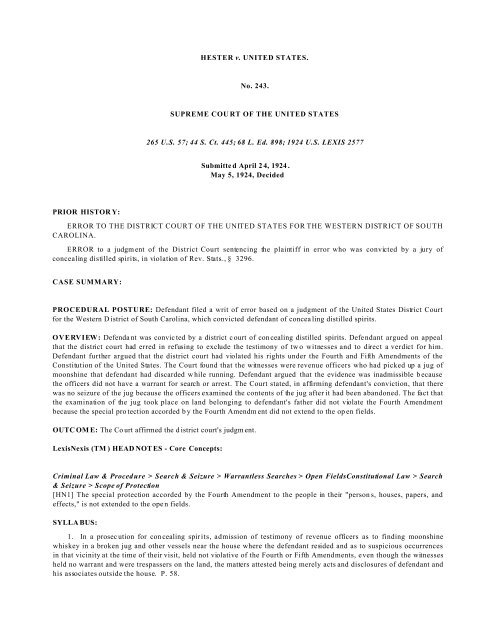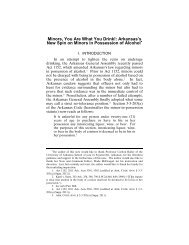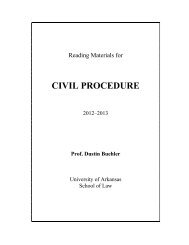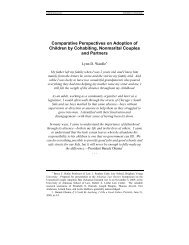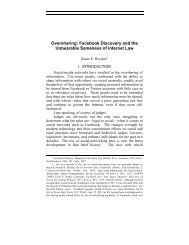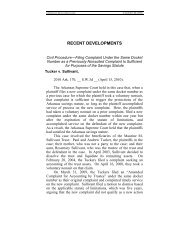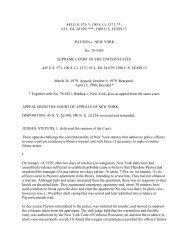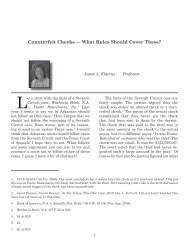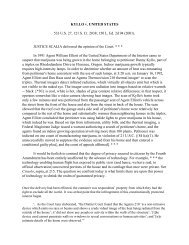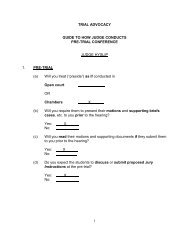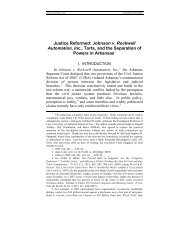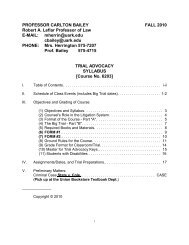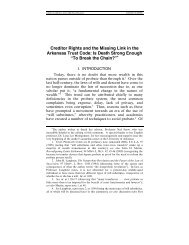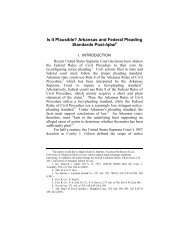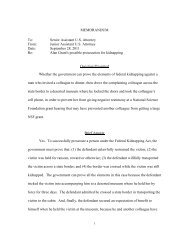Hester v. U.S.
Hester v. U.S.
Hester v. U.S.
Create successful ePaper yourself
Turn your PDF publications into a flip-book with our unique Google optimized e-Paper software.
PRIOR HISTOR Y:<br />
HESTER v. UNITED STATES.<br />
No. 243.<br />
SUPREME COURT OF THE UNITED STATES<br />
265 U.S. 57; 44 S. Ct. 445; 68 L. Ed. 898; 1924 U.S. LEXIS 2577<br />
Submitted April 24, 1924 .<br />
May 5, 1924, Decided<br />
ERROR TO THE DISTRICT COURT OF THE UNITED STATES FOR THE WESTERN DISTRICT OF SOUTH<br />
CAROLINA.<br />
ERROR to a judgment of the District Court sentencing the plaintiff in error who was convicted by a jury of<br />
concealing distilled spirits, in violation of Rev. Stats., § 3296.<br />
CASE SUMMARY:<br />
PROCEDURAL POSTURE: Defendant filed a writ of error based on a judgment of the United States District Court<br />
for the Western District of South Carolina, which convicted defendant of concealing distilled spirits.<br />
OVERVIEW: Defenda nt was convicted by a district court of concealing distilled spirits. Defendant argued on appeal<br />
that the district court had erred in refusing to exclude the testimony of two witnesses and to direct a verdict for him.<br />
Defendant further argued that the district court had violated his rights under the Fourth and Fifth Amendments of the<br />
Constitution of the United States. The Court found that the witnesses were revenue officers who had picked up a jug of<br />
moonshine that defendant had discarded while running. Defendant argued that the evidence was inadmissible because<br />
the officers did not have a warrant for search or arrest. The Court stated, in affirming defendant's conviction, that there<br />
was no seizure of the jug because the officers examined the contents of the jug after it had been abandoned. The fact that<br />
the examination of the jug took place on land belonging to defendant's father did not violate the Fourth Amendment<br />
because the special protection accorded by the Fourth Amendm ent did not extend to the open fields.<br />
OUTCOME: The Co urt affirmed the d istrict court's judgm ent.<br />
LexisNexis (TM ) HEAD NOTES - Core Concepts:<br />
Criminal Law & Procedure > Search & Seizure > Warrantless Searches > Open FieldsConstitutional Law > Search<br />
& Seizure > Scope of Protection<br />
[HN1] The special protection accorded by the Fourth Amendment to the people in their "persons, houses, papers, and<br />
effects," is not extended to the open fields.<br />
SYLLABUS:<br />
1. In a prosecution for concealing spirits, admission of testimony of revenue officers as to finding moonshine<br />
whiskey in a broken jug and other vessels near the house where the defendant resided and as to suspicious occurrences<br />
in that vicinity at the time of their visit, held not violative of the Fourth or Fifth Amendments, even though the witnesses<br />
held no warrant and were trespassers on the land, the matters attested being merely acts and disclosures of defendant and<br />
his associates outside the house. P. 58.
2. The pro tection acco rded by the Fourth Amendment to the peo ple in their "persons, houses, papers, and effects,"<br />
does not extend to open fields. Id.<br />
Affirmed.<br />
COUN SEL:<br />
Mr. Richard A. Ford for plaintiff in erro r. Mr. H. P . Burbage was also on the brief.<br />
Mr. Solicitor General Beck and M rs. Mabel W alker Willebrandt, Assistant Attorney General, for the United States.<br />
OPINIONBY:<br />
HOLMES<br />
OPINION:<br />
[*57] [**446 ] [***899] M R. JUSTICE HOLM ES delivered the opinion of the Court.<br />
The plaintiff in error, <strong>Hester</strong>, was convicted of concealing distilled spirits &c. under Rev. Stats., § 3296.T he case is<br />
brought here directly from the District Court on the single ground that by refusing to exclude the testimony of two<br />
witnesses and to direct and verdict for the defendant, the plaintiff in error, the Court violated his [*58] rights under the<br />
Fourth and Fifth Amendments of the Constitution of the United States.<br />
The witnesses whose testimony is objected to were revenue officers. In consequence of information they went<br />
toward the house of <strong>Hester</strong>'s father, where the plaintiff in error lived, and as they approached saw one Henderson drive<br />
near to the house. They concealed themselves from fifty to one hundred yards away and saw <strong>Hester</strong> come out and hand<br />
Henderson a quart bottle. An alarm was given. <strong>Hester</strong> went to a car standing near, took a gallon jug from it and he and<br />
Henderson ran. One of the officers pursued, and fired a pistol. <strong>Hester</strong> dropped his jug, which broke but kept ab out a<br />
quart of its contents. Henderson threw away his b ottle also. The jug and bottle both contained what the officers, being<br />
experts, recognized as moonshine whiskey, that is whiskey illicitly distilled; said to be easily recognizable. The other<br />
officer entered the house, but being told there was no whiskey there left it, but found outside a jar that had been thrown<br />
out and broken and that also contained whiskey. While the officers were there other cars stopped at the house but<br />
[***900] were spoken to by <strong>Hester</strong>'s father and drove off. T he officers had no warrant for search or arrest, and it is<br />
contended that this made their evidence inadmissible, it being assumed, on the strength of the pursuing officer's saying<br />
that he supposed they were on <strong>Hester</strong>'s land, that such was the fact. It is obvious that even if there had been a trespass,<br />
the above testimony was not obtained by an illegal search or seizure. The defendant's own acts, and those of his<br />
associates, disclosed the jug, the jar and the bottle -- and there was no seizure in the sense of the law when the officers<br />
examined the contents of each after it had been abandoned. This evidence was not obtained by the entry into the house<br />
and it is immaterial to discuss that. The suggestion that the d efendant was compelled to give evidence aga inst himself<br />
[*59] does not require an answer. The only shadow of a ground for bringing up the case is drawn from the hypothesis<br />
that the examination of the vessels took place upon <strong>Hester</strong>'s father's land. As to that, it is enough to sa y that, apart from<br />
the justification, [HN 1] the special protection accorded b y the Fourth Amendm ent to the people in their "persons,<br />
houses, papers, and effects," is not extended to the open fields. The distinction between the latter and the house is as old<br />
as the common law. 4 Bl. Comm. 223, 225, 226.


